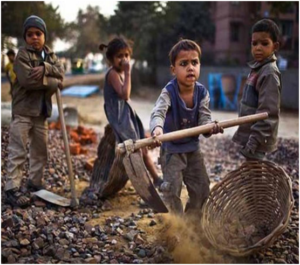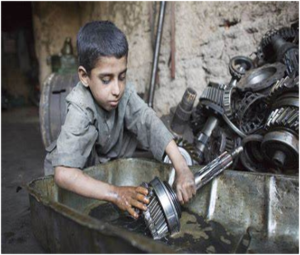
Child Labour in Pakistan

Child labour is a global issue that is prevalent in many countries, including Pakistan. It is a problem that has been around for decades, and despite efforts by the government and various organizations, it continues to persist.
The International Labour Organization defines child labour as work that deprives children of their childhood, their potential, and their dignity, and that is harmful to their physical and mental development. In this article, we will discuss the issue of child labour in Pakistan and its impact on children.
What is Child Labour?

Child labour refers to the exploitation of children for work that is detrimental to their physical, mental, social, or educational development. It involves the employment of children in various sectors, such as agriculture, manufacturing, mining, domestic work, street vending, and many other forms of work.
Child labour often deprives children of their childhood and prevents them from attending school, which can have long-term negative effects on their physical and mental well-being, as well as their future prospects. It is generally considered a violation of children’s rights and is prohibited by international law.
Pakistan is a developing country with a population of over 220 million people. According to the International Labour Organization, there are approximately 12.5 million children engaged in child labour in Pakistan. This is a significant number and a cause for concern.
Child labour is prevalent in both urban and rural areas of Pakistan, and children as young as five years old are forced to work in hazardous conditions. The most common forms of child labour in Pakistan include domestic work, agriculture, brick kilns, carpet weaving, mining, and street vending.
The Causes of Child Labour in Pakistan.

One of the major causes of child labour in Pakistan is poverty. Many families living in poverty cannot afford to send their children to school and must rely on their children to work in order to make ends meet. In addition, the lack of access to education and the high cost of schooling makes it difficult for children to receive an education, which leads to a vicious cycle of poverty and child labour.
Another factor that contributes to child labour in Pakistan is the lack of awareness and enforcement of child labour laws. Although Pakistan has laws that prohibit child labour, they are not enforced effectively. The government does not have the resources to monitor and enforce these laws, and many employers take advantage of this by hiring children to work in their factories and businesses
The impact of child labour on children is devastating. Children who work are often deprived of their childhood and are unable to attend school. This leads to a lack of education and limited opportunities for these children in the future. Child labour also exposes children to hazardous working conditions, which can lead to serious health problems.
Children who work in brick kilns, for example, are exposed to toxic fumes and suffer from respiratory problems. Children who work in mines are at risk of injuries and accidents, and those who work in carpet weaving suffer from back pain and eye problems.
Child labour also has a psychological impact on children. Children who work are often isolated from their peers and do not have the opportunity to play and socialize with other children. This can lead to feelings of loneliness and depression. In addition, children who work are often subjected to verbal and physical abuse, which can cause trauma and anxiety.
Efforts have been made to address the issue of child labour in Pakistan. The government has implemented various policies and programs to eradicate child labour, including the National Child Labour Survey and the National Action Plan for the Elimination of Child Labour. NGOs and international organizations have also been working to raise awareness about the issue and provide education and support to children who are forced to work.
In conclusion, child labour is a serious problem in Pakistan that affects millions of children. It is a result of poverty, lack of access to education, and ineffective enforcement of child labour laws. Child labour has a devastating impact on children’s physical and mental health, as well as their future opportunities. It is essential that the government and other organizations continue to work together to address this issue and ensure that every child in Pakistan has the opportunity to receive an education and enjoy their childhood.







